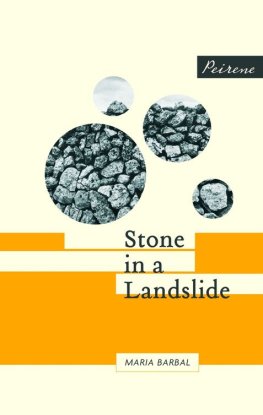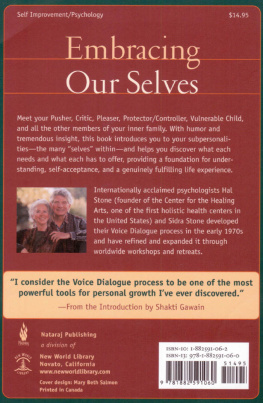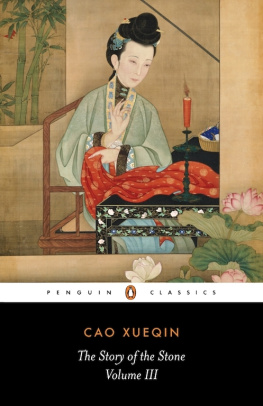Maria Barbal
Stone in a Landslide
Anyone could see that there were a lot of us at home. Someone had to go. I was the fifth of six children Mother used to say I was there because God had wanted me to be there and you have to take what He sends you. The eldest was Maria, who, more than Mother, ran the house. Josep was the son and heir and Joan was going into the church. We three youngest were told a hundred times that we were more of a burden than a blessing. These werent years of plenty, there were a lot of mouths to feed and not much land, which of course left a hole. So it was decided that I, who was level-headed and even-tempered, would be sent to help my mothers sister, Tia. Shed given up hope of having children but wasnt short of work. She had married a man much older than her who owned land, at least half a dozen cows, poultry and rabbits, as well as a vegetable garden. They got by well enough, but they could do with an extra pair of hands and with the company because they were starting to feel their age. I was thirteen when, with a bundle of clothes in my arms, my father on my left and Maria on my right, I left my family, home, village and mountain. It was just a few kilometres between Ermita and Pallars, but it meant a days walk and losing sight of home. At the time, this hurt me more than anything else. As I walked away, I left the only world I had ever known behind.
We walked in silence to the market at Montsent, where my father and Maria were going to pick up some things for home and hand me over to my aunt and uncle. On the way, all that I could think of were the good things about my village. I had never left except to take the animals up the mountain in spring to graze or to sneak off to the Festa Major held every year by the four houses which made up the next village. There were a lot of people and not much to eat at those festivals.
I remember the three winters I went to school. Unless you had older sisters to do all the work at home, you didnt go to school if you were a girl. How lucky to be one of the youngest! The teacher made us write in big round letters with little ticks at the end. The r started with a curl on the left that I thought looked like a corkscrew. At school we were never cold because Doa Paquita wasnt going to bow to the meanness of our families she insisted on a good pile of wood every week for the classroom because she said letters only go in when theyre warmed up a little, and if anyone wants you to learn anything then they need to show a bit of good will. She said it in Spanish poner un poco de buena voluntad. The little I know, I learnt in Spanish. I have forgotten most of it. I was amazed the first few times she spoke, this teacher of ours who came from outside. No one understood her. Eventually we did, and she understood us when we talked too, although I dont know why she pretended not to. Maybe she was ashamed of understanding us, or did it out of spite.
I still remember those winter classes as if I was in one this morning. I always sat with Magdalena. Whenever she was supposed to read aloud I couldnt help laughing and Magdalena would stop reading. Doa Paquita would then push back her glasses and glare at me like a sergeant major. Id get a stomach ache from trying not to laugh when Magdalena started to read again and Id often feel a little warm drop of pee in my knickers.
I liked going to school. It was special and made me feel being small was good. At home you were just a nuisance. If you played in the haystack, you were making a mess. If you went too close to the fire and clattered the saucepans, youd caused God knows what kind of calamity. If you picked up a stone or piece of wood to play, you were going to hit someone with it. You were only safe if you were helping to do the milking, peeling potatoes, or carrying firewood. That was being grown-up, but you werent allowed to have a sip of wine from the porr or any bacon after youd done your work, because for that you werent grown-up enough.
From the kitchen window the roof of the Sarals house looked like a high bell tower and the slates sparkled like little mirrors. The rain had stopped and while Mother prepared a thick sheet with ash to do the washing, drops plunged off our roof and hurled themselves at the glass of the window. I watched the channels they made and listened to my mother telling the same story but from a different angle. Tia would have loved to have a daughter like you but God has not granted her wish. And you look more like her than Maria or Nuri, with that long red hair. Dont forget she was the prettiest of us four sisters, and thats why shes made such a good match. You and I, we have the same eyes, like your grandmothers, may she rest in peace, and Tia Encarnacis eyes are very similar too.
But thats not all here Mothers hands piled the wood to light the fire they need someone. Who better than one of the family to benefit from this blessing of work
I couldnt get a single word out even though there was lots I wanted to say. But when she fell silent, I felt a knot in my throat as if a rope around my neck were being pulled from both ends. It began to hurt until the first sob rose in my chest and burst open the knot and then a river of furious tears escaped me, because the last thing I wanted to do was cry. There was no need to say anything. I knew if my mother was spending a morning working quietly at home and talking to me, in no hurry, without interrupting herself all the time with Do this, Wheres that? or Have you tidied upstairs yet? it meant this was a solemn occasion. And at home there was little time for solemnity. She brought me a handkerchief and gave me more explanations. They all ended in tears too. Between first my sobs and then hers the scrap of white cotton became a bluish rag, until there was silence. I fixed my eyes on the ground. The fire had started to get hot. It gave me a headache and an irresistible desire to sleep.
The next time I became aware of my mother speaking, she must have been going for a while. As I listened to her, my throat began to tighten again. And so before I choked, I said in a small voice that I would go and live with Tia Encarnaci, and when would they come for me? Theyre going to the market on Monday. Your father and Maria will take you there.
My mother was a woman who knew only two things: how to work and how to save. Maria used to tell us that when our youngest brother Pere was born, my mother was at deaths door. That was on the Monday and by the Friday, not even a week later, they couldnt keep her in bed. At thirteen years old I couldnt remember seeing her sit still apart from in a pew at Mass on Sunday.
By the time we got up, she would have been working for ages already or even have gone off to the meadows with my father and Josep. When we went upstairs to bed, she used the time without us to prepare the next days meal or tidy the house. She was always the last to go to bed and sometimes shed say a rosary. But for all her devotion, Im sure she didnt even get to half a mystery. Her tiredness must have held her trapped, like a sparrow in a snare.
She certainly loved us all, but she hardly ever showed it. She didnt have time for all that she would say that there were more important things that needed her attention first. She didnt know what an idle hour was and was convinced that she had no right to one. When she was old and had time on her hands, she let it slip through her fingers. I think she would rather have died than rested.
There was plenty of work: animals, land and at least seven or eight people to feed. We all helped, but she was the one who put her shoulder to the wheel most to keep it all going. Woman is the heart and soul of the home, she would say.
My father was more talkative, and sometimes hed say mean things that if you thought them over alone, hurt a bit. On the other hand, he often played with us and put us on his knee and told us stories, most of all in winter when the fire drew us all together after a dinner of vegetables and when there was some a sliver of bacon. I remember how we laughed at the story of the old man from Montenar who took the underpants. They were spread out on a bench by the fire to dry. The old man sat down to warm himself. When he got up, a pair of them stuck to his clothes and it was only when he was halfway home, on a freezing cold night, that he realized he had a pair of pants bumping against the back of his legs. He stopped dead on the spot, torn between walking off with them like a thief or going back and ending up frozen stiff like a bird.










